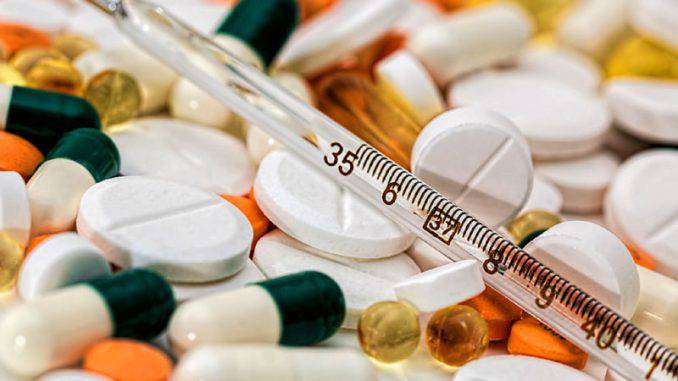
Whether we like it or not, antibiotics are a part of our lives and our main line of defense against several diseases, including ones that were incurable and lethal just a few decades ago. No doubt – antibiotics play an important role in today’s society.
However, antibiotics are also known to have some very harmful effects.
While clearing our bodies from harmful bacteria and infections, antibiotics cause collateral damage by also killing the good bacteria in our guts.
After antibiotic treatments, our body finds itself in severe distress because antibiotics have almost destroyed its gut microbiota. This creates a microbial imbalance in our bodies, and the condition is known as dysbiosis.
Dysbiosis is not a disease. It is a microbiological condition caused by a disrupted balance in the intestinal microbiome. Still, it can lead to severe gastrointestinal diseases like gastritis, colitis, including its more severe form – ulcerative colitis.
One particular bacteria that may be a real concern after antibiotic treatments is Clostridium difficile. “C. difficile” (as it is known) causes opportunistic infections which can lead to relatively mild symptoms like diarrhea but also cause more severe conditions like inflammation of the colon, which can be even life-threatening.
The way C. difficile infection starts is quite typical: when antibiotics wipe out most of the populations of beneficial bacteria and disrupt the healthy balance in the gut’s microbiome, this creates a wide-open niche for C. difficile to overgrow and cause severe infections.
According to The National Library of Medicine, small children are especially prone to dysbiosis. The intestinal microflora is formed and stabilized in the first years of life, while a child is born with a sterile gut and with almost missing gut microbiota.
The child’s gut reaches the strength and complexity of the microbiota of an adult no earlier than the age of 3 and is, therefore, more susceptible to the adverse effects of antibiotics.
Antibiotics should be used with extreme caution in children, and in such cases the intake of probiotics should be strongly advised.
Elderly people should also be extremely careful with antibiotics. Since with age the immune system weakens and the maintenance of the right balance in the gut’s microbiota becomes increasingly difficult, older people tend to be more prone to antibiotics-related health conditions.
Probiotics compensate for the damages of antibiotics
Several studies have shown that taking probiotics containing live healthy bacteria can reduce the risk of antibiotic-associated dysbiosis.
And, as we already know, the product that contains the most numerous strains of probiotic bacteria is unquestionably Kefir. Besides its richness in probiotic bacteria, Kefir is also rich in biotin, a coenzyme of vital importance for many essential cellular processes related to the metabolism and absorption of Vitamins. This increased absorption of Vitamins is considered an additional “collateral benefit” of Kefir.
However, a necessary clarification about Kefir has to be made:
Although Kefir contains the highest number of probiotic bacteria, it still does not contain ALL bacteria and micro-elements that generally populate the guts. Additionally, as the probiotic bacteria of Kefir tend to colonize the gastrointestinal tract, they may create a temporary disbalance in the guts’ microbiome.
That is why, besides the intake of Kefir, it is a good idea after antibiotic treatment to stick to a diet as varied as possible, allowing the guts to be repopulated with the complete set of beneficial bacteria it needs.
Yet, it is clear that there is no other probiotic product that contains as many and as various probiotic bacteria as Kefir does. It is not by chance that Kefir is often called “The broad-spectrum probiotic“, able to effectively counterbalance the negative effects of the nowadays modern “broad-spectrum antibiotics”.
But there’s more:
Kefir acts as a potent immune modulator.
For centuries, Kefir has been renowned for its ability to act as an immune modulator. Undoubtedly, the live bacteria of Kefir are one of the most potent probiotics, directly influencing and balancing our entire immune system.
By killing the “good bacteria” in our guts, the antibiotics also weaken our immune system. That is where Kefir can be helpful with balancing the gut microbiome, thus restoring the normal functions of the immune system.
But here comes the most crucial part: Did you notice that we used the word “modulator” and not a word like “booster”?
Yes, Kefir does not somehow “stimulate” or “rev up” our immune system, but it instead balances it and makes it adequate for the environment.
It is a modern trend recently to take drugs that stimulate the immune system, erroneously thinking that in this way it will better protect us from diseases.
However, this is not exactly how the immune system works. An overstimulated and hyperactive immune system may adversely affect our health because sometimes it may overreact and start to fight against our bodies. Such overreactions are the basis of the so-called autoimmune diseases that nowadays appear to be increasingly widespread.
That’s why Kefir, and probiotics in general, are better than any drugs that may stimulate the immune system. Instead of “boosting” or “stimulating” the immune system, probiotics tend to balance and harmonize it.
Kefir acts as a natural antimycotic
After antibiotic treatments, the human body becomes very prone to various types of mycosis. Antibiotics are known to mainly affect and discard bacteria, while fungi remain relatively unaffected. After antibiotic treatment, the human body runs a risk of fungal overgrowth resulting in various fungal infections.
Kefir then again comes to the rescue as a powerful antifungal agent. Kefir is an entirely natural antimycotic that attacks fungal infections while stabilizing the immune system. It is the ideal substance for restoring the normal balance of the intestinal microbiome, thus reducing the risk of both mycotic and bacterial infections.
Kefir helps with detoxification.
To do their job, antibiotics usually contain toxic substances that sometimes take time to be discarded from our bodies after the treatment, and Kefir stimulates and facilitates the disposal of these toxins. Kefir is, therefore, an indispensable tool for the detoxification of our bodies after antibiotic treatments.
The results are visible after only a few intakes of Kefir: swelling in the limbs and abdomen, which usually follows antibiotic treatments, disappears, cholesterol decreases, blood sugar and blood pressure get normalized, and you feel a surge of energy.
Kefir leads to rejuvenation.
The effect of a long-lasting treatment with antibiotics is usually quite visible: tired face, sagging skin, dry hair, or in other words – we look older.
Kefir contains many antioxidants that have a remarkable rejuvenating effect. Its potent antioxidant abilities drastically decrease cellular oxidation, which is why Kefir is usually called “the elixir of youth“.
Kefir facilitates hormonal balance.
Kefir is also indispensable in hormonal imbalance because it normalizes the hormones that usually make us irritable, suffer from insomnia or depression, or have hair and skin problems – relatively frequent symptoms after long antibiotic treatments.
Is Kefir always better than prescription probiotic pills?
The short answer is: it depends!
Not all antibiotics are the same, and not all probiotics available in pharmacies in the form of pills are the same.
The probiotics you may randomly find in pharmacies contain particular strains of bacterial cultures that may be beneficial for certain types of antibiotics but inefficient for others.
So, if the “commercial” probiotic pills have been prescribed by your medical doctor together with your specific antibiotic, it may be best suited for it, and its effect may even be better than the one of Kefir.
On the other hand, as we already said before, Kefir is known to contain the largest number of probiotic bacteria compared to any other food product. It is known as a “Broad-spectrum probiotic“, and the probiotic bacteria your antibiotic treatment may require are unlikely to be missing in Kefir.
The multitude and variety of probiotic strains found in Kefir make it the most polyvalent probiotic product and thus a better option than any probiotic pills you may find in pharmacies.
Summary
Along with their unconditional benefits in the treatment of a long list of severe diseases, antibiotics also cause “collateral damage” by killing many beneficial bacteria in our guts. Antibiotic treatments usually lead to severe disbalance in the gut’s microbiome which may be followed by a condition called dysbiosis.
By destroying the “good bacteria” in our gastrointestinal tract, the antibiotics also weaken our immune system and create favorable conditions for the overgrowth of fungi that may cause severe fungal infections.
In these circumstances probiotics (and Kefir, in particular) may be extremely helpful first of all with their ability to repopulate the guts with the beneficial bacteria that normally belong there, but have been eliminated by the antibiotics.
Secondly, Kefir has a series of proven benefits in acting as an immune system modulator, natural antimycotic agent (preventing fungal overgrowth), and a powerful detox agent able to successfully eliminate from our bodies all toxic substances that are inevitably a part of any antibiotic drug.
Kefir contains more probiotic bacteria than any other food product and is known as a “broad-spectrum probiotic” able to counteract the inevitable collateral damage caused by just any kind of antibiotic.
Related questions
-
When to take the probiotics during antibiotic treatment?
While there are no commonly accepted guidelines for when to take probiotics, experts typically advise against taking probiotics and antibiotics at the exact same time. In this way, the toxic substances of antibiotics could directly kill the probiotic bacteria that have been ingested. So, if you’re taking an antibiotic in the morning and in the evening, it is a good idea to get the probiotics at lunch. Or the other way round. -
Is there a prescribed quantity of Kefir to take with antibiotics?
There can’t be anything like a “Kefir overdose”. The usual (and healthy) daily quantity of Kefir is one or two glasses of Kefir (200 to 400 milliliters or 7 to 14 ounces), but note that once Kefir is ingested, it tends to balance the “ecosystem” in your guts, and any excess of Kefir’s bacteria get naturally eliminated from the body with no side effects. Even if sometimes excessive consumption of Kefir may cause certain gastric or intestinal discomfort, it is always outbalanced by the benefits that Kefir brings to our bodies.
Related resources
- Kefir pros and cons
- Can Kefir help with Candida infections?
- Can Kefir help with high blood pressure?
- Can Kefir help with acid reflux?
- Can Kefir help with SIBO treatment?
- Is Kefir good for osteoporosis?
- Can Kefir help with IBS?
- Is Kefir safe during pregnancy?
- Is Kefir safe while breastfeeding?
- Can Kefir help with diabetes?
- Can Kefir help with weight loss?
- Possible dangers of Kefir
- Tools and kitchenware you need for your homemade Kefir



